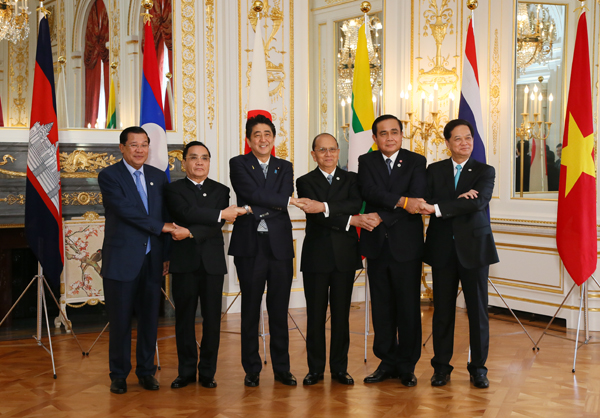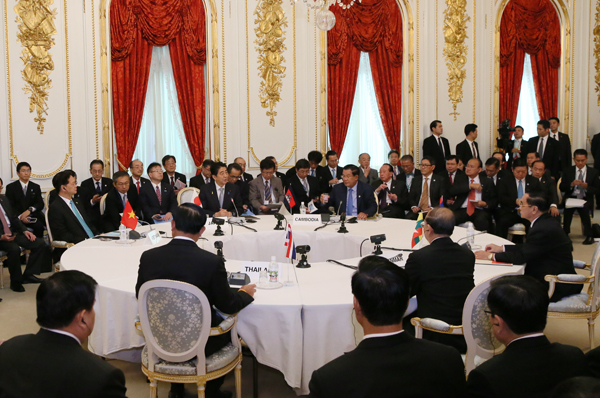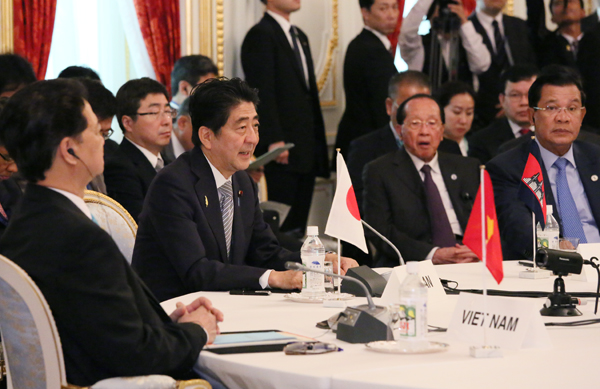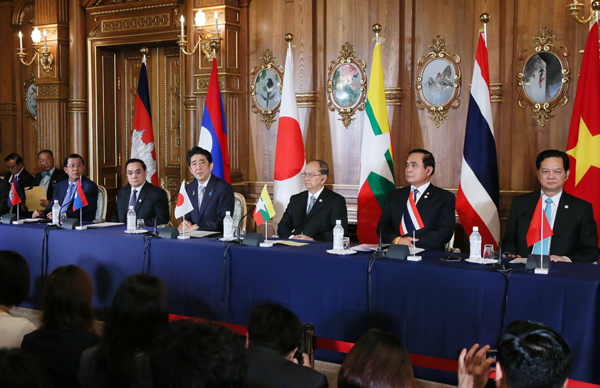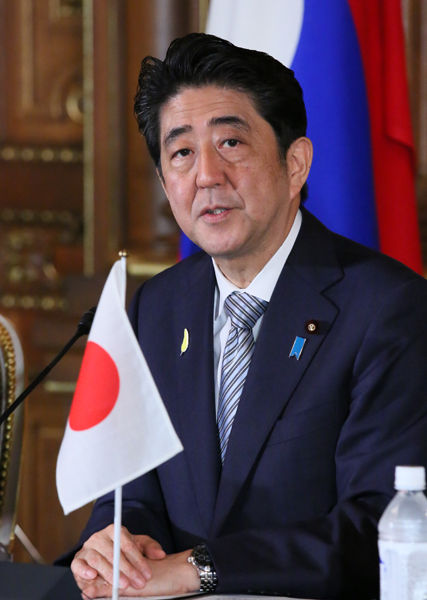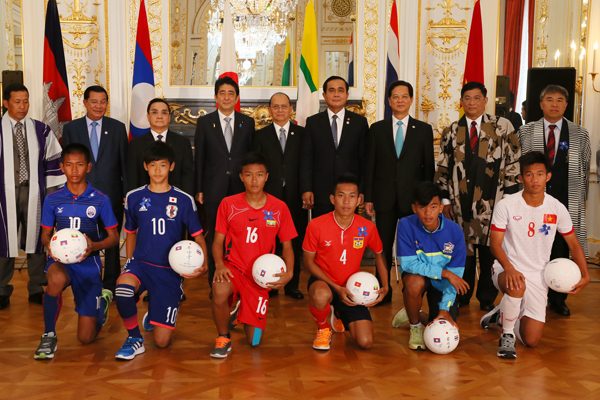Home > News > The Prime Minister in Action > July 2015 > Mekong-Japan Summit Meeting and Other Events
The Prime Minister in Action
Mekong-Japan Summit Meeting and Other Events
July 4, 2015
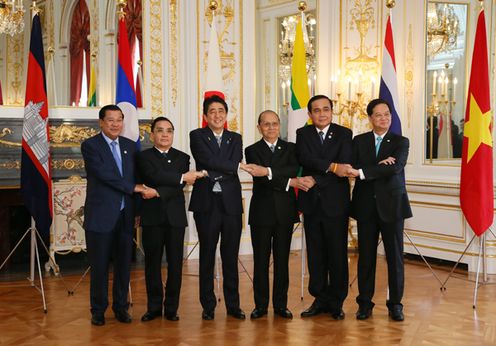
Photograph of the Mekong-Japan leaders' photo session
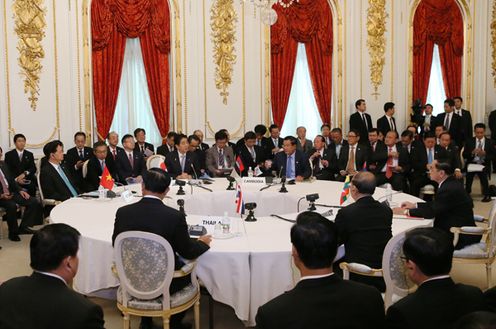
Photograph of the Seventh Mekong-Japan Summit Meeting (1)
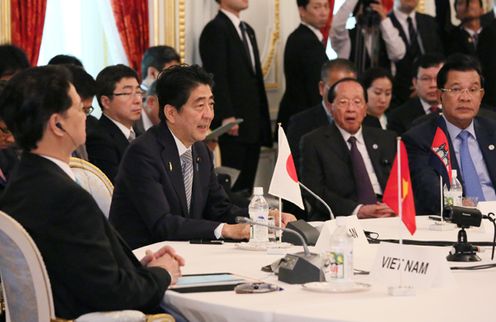
Photograph of the Seventh Mekong-Japan Summit Meeting (2)
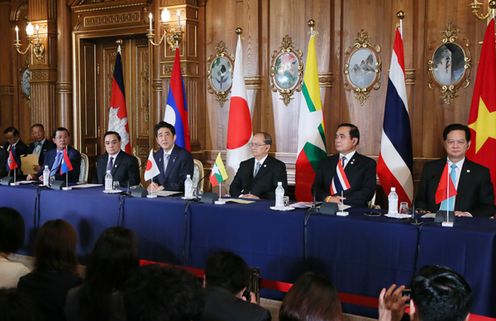
Photograph of the leaders of Japan and the Mekong region attending the joint press announcement
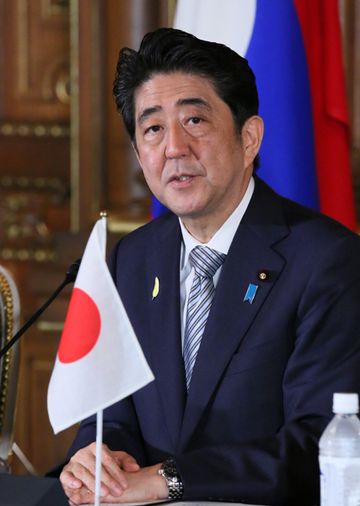
Photograph of the Prime Minister attending the joint press announcement
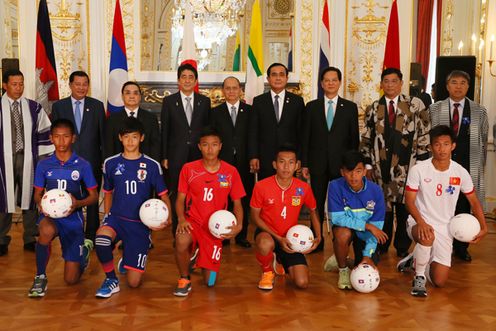
Photograph of the ceremony to award commemorative gifts to soccer teams
[Provisional Translation]
Prime Minister Shinzo Abe attended the Seventh Mekong-Japan Summit Meeting and other related events held in Tokyo.
The Prime Minister welcomed each country’s leaders, and then attended a commemorative photo session.
Afterwards, the Prime Minister attended the Seventh Mekong-Japan Summit Meeting, and then held a joint press announcement with the leaders of each country.
In addition, the Prime Minister also awarded commemorative gifts to soccer teams from Japan and each Mekong region country.
In his opening address at the summit meeting, the Prime Minister said,
“I am very pleased to be able to welcome you all and hold the Seventh Mekong-Japan Summit Meeting today.
Peace and stability in the Mekong region, a key region for land and sea transport, is extremely important for Japan. Furthermore, with its continuing strong economic growth, the Mekong region is a growth partner for Japan with a bright future.
Here, on the verge of the inauguration of the ‘ASEAN community,’ I would like to review the achievements of the ‘Tokyo Strategy 2012,’ and have a frank discussion for the formulation of a new strategy toward ‘high quality growth’ in the Mekong region.
Over these past three years, steady results have been made in Japan-Mekong cooperation based on the ‘Tokyo Strategy 2012’ under the three pillars of 1) Enhancing Mekong Connectivity; 2) Development Together; and 3) Ensuring Human Security and Environmental Sustainability.
We have already achieved the full transference of the approximately 600 billion yen of ODA support announced three years ago to be offered over the following three years. This shows Japan’s strong resolve.
Over that time frame, in terms of the first pillar of enhancing Mekong connectivity, Japan has supported ‘high quality infrastructure’ development in each country, including projects for the Neak Loeung Bridge in Cambodia, National Road No. 9 and the Vientiane International Airport in Laos, the development of Thilawa in Myanmar, railways in Thailand, and the Noi Bai International Airport in Viet Nam.
Concerning the second pillar, toward the development of the region, over the past three years, the number of Japanese companies with presences in Cambodia, Laos, and Myanmar has doubled, and thanks to the relaxation of visa requirements, the number of visitors to Japan from ASEAN reached record figures last year. We have also worked hard to actively support cultural and personal exchanges, as well as Japanese language learning.
Toward the third pillar, that of ensuring human security, at the end of last year, we had valuable discussions on the improvement of urban environments and disaster measures at the Third Green Mekong Forum.
We will also steadily follow up with the ‘Sendai Declaration’ and ‘Sendai Framework for Disaster Risk Reduction 2015-2030’ agreed upon at the Third UN World Conference on Disaster Risk Reduction.
The development of Japan-Mekong cooperation is important to regional stability. Japan welcomes the initiatives of each country for democratization, efforts toward the restoration of democracy, national reconciliation, the rule of law, and human rights.
I commend initiatives for regional human rights issues such as the Special Meeting on Irregular Migration in the Indian Ocean held in May in Thailand. Last month, Japan announced an additional US$3.5 million of support.
In the seventy years since the end of World War II, Japan has exerted every effort as a peace-loving nation for peace and prosperity in Asia. We will continue to contribute to movements toward peace building and democratization across Asia. Based on the path we have taken, Japan has hoisted the banner of proactive contribution to peace based on Japan’s principles of international cooperation.
Last month in Tokyo we held a high level seminar on peace building for the first time, and I am grateful for the contributions from the Mekong region.
The ‘Tokyo Strategy 2012’ has produced good results. We have entered a stage that will see Japan-Mekong initiatives advance to an even higher level.
Lastly, I am aware that there are leaders who have been able to make time to visit regional areas of Japan this time. It is my hope that you will experience the charm of Japan’s regions, which are full of diverse cultures, history, and nature, and that this will contribute to further regional exchanges and exchanges among our peoples in the future.”

